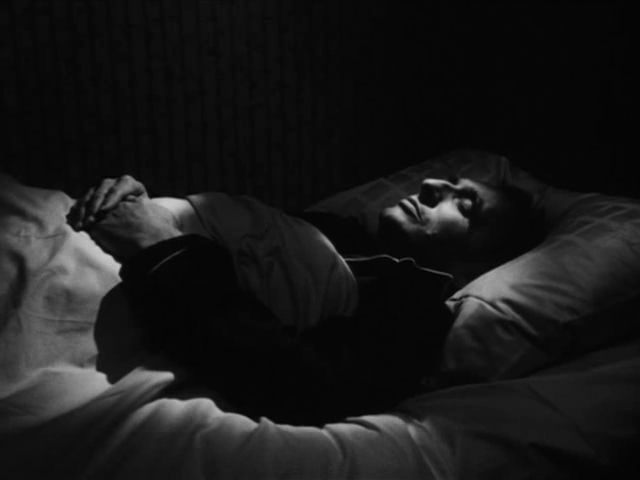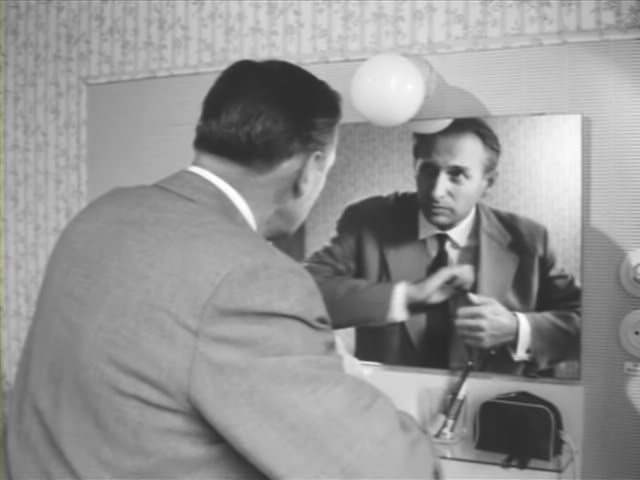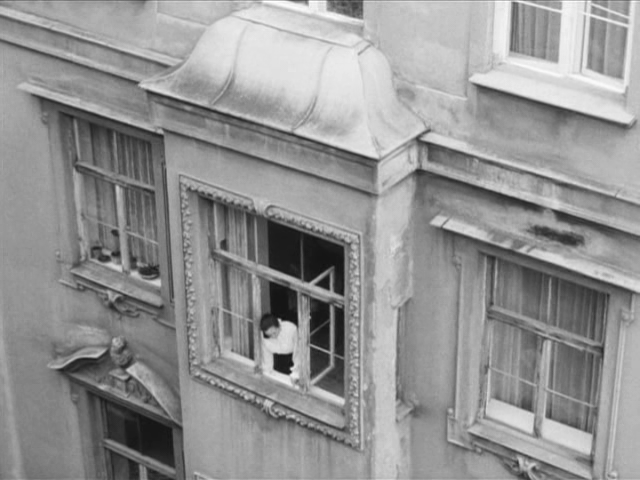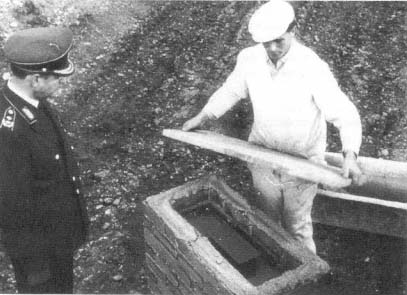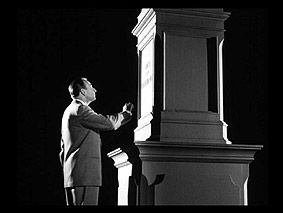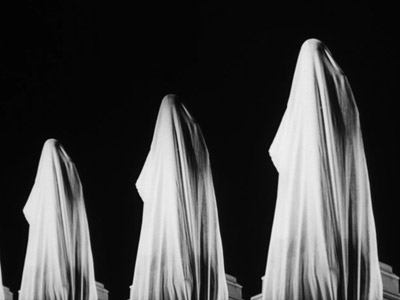From Monthly Film Bulletin, January 1975 (Vol. 42, No. 492). — J.R.
Machorka-Muff
West Germany/Monaco, 1963 Director: Jean-Marie Straub
Germany, in the early 1950s. Colonel Machorka-Muff arrives in
Bonn to see his mistress Inn and continue his efforts to clear the
name of General Hürlanger-Hiss from disgrace after his retreat at
Schwichi-Schwalache during World War II. At his hotel the next
morning, after meeting and exchanging pleasantries with a lower
rank officer he commanded, he also sees Murcks-Maloche from the
Ministry, who informs the Colonel that he is to give the dedication
address at the foundation-laying ceremony to inaugurate the
Hürlanger-Hiss Academy of Military Memories. After the Colonel
spends the morning walking through Bonn, Inn picks him up in her
Porsche and they drive to her flat and make love. She wakes him a
few hours later to announce the arrival of the Minister of Defense,
who presents him with a general’s uniform and drives him to the
ceremony; there Machorka-Muff announces in his dedication that
Hürlanger-Hiss made his retreat after losing 14,700 men, not “only”
8,500 as previously-thought. At mass the next morning, Inn
recognizes the second, fifth and sixth of her seven former husbands,
and Machorka-Muff announces that he will be the eighth; afterwards,
the priest explains that there will be no problem in having a church
wedding because all of her former marriages were Protestant ones.
They drive to Petersberg to visit Inn’s family. Murcks-Maloche
comes to the villa to report that the Opposition has expressed
dissatisfaction with the Academy; when Machorka-Muff tells
this to Inn, she replies that her family has never been opposed.
Paradoxically, the above synopsis of Straub’s first film — which
might seem long enough to furnish the plot of a conventional
feature — is in fact a drastic reduction of what is already a sharp
paring down, by Straub and Huillet, of a very short story by
Heinrich Böll (known as Bonn Diary in English, and occupying only
ten short pages in Böll’s collection Absent Without Leave). Thus
to recapitulate the plot in abbreviated form raises the same central
question that Straub poses; namely, what is necessary? For Karl-
heinz Stockhausen, who wrote Straub an enthusiastic letter after
seeing the film at Oberhausen in 1963, it is a film entirely without
ornamentation. On the other hand, story and film alike are motored
on nothing but the accumulation of details, and it is debatable just
how many of these are absolutely essential either to Böll or to Straub:
the latter omits, for example, a performance of a concerto for seven
drums given after the laying of the Academy’s cornerstone, which is
renamed the Hürlanger-Hiss Memorial Septet; and omitted from the
above synopsis are such details as the hero’s solipsistic dream of
encountering several memorials inscribed with his name, experienced
the night of his arrival in Bonn, and his remark in the narration that
he’d like to have an affair with Heffling’s wife, which is full of blatant
class overtones. But how much do we need to know about Machorka-
Muff’s odiousness and what it entails for enlightenment to register?
Straub has helpfully added a series of street placards (“To become old
and remain young is the hope of everyone’) and newspaper headlines
(“Will We Become Hammer or Anvil?”) to punctuate his walk through
Bonn and thereby underline both his psychology and the historical
context; here and elsewhere, pans from hero to urban or country
landscapes (or texts) and vice versa imply ideological as well as visual
continuities — the opening pan across a vista of Bonn at night, indeed,
has a rather Mabuse-like aspect. And the concentration and mainly
fast cutting serve to make each shot of the film a deadly little
‘monument’ to Machorka-Muff, like the row of these glimpsed in his
dream –- successive nails driven into the bland surface of his congested
myth. But to understand Straub’s precision with any clarity, a reading
of the Böll story is almost obligatory; otherwise, it is difficult to
assimilate the narrative details as rapidly as Straub dispenses with
them. Stockhausen’s very sensitive appraisal (reprinted in Richard
Roud’s book on Straub) treats the rhythms of the film musically, and
certainly this analogy carries some application; but it is possible that
the poetics of Ezra Pound, in his reduction of The Waste Land and some
of his own poems to their final states, may be equally useful to an
understanding of Straub’s approach to his material. The coolness of
Erich Kuby’s narration, the clean economy of the images, and the
marvelously abrupt ending — a sudden closing cadence with some
of the effect of a slammed door – all suggest a profusion of shots,
details and feelings forcibly hammered together to form a continuous,
dark and extremely packed surface. It is an appropriate enough
cornerstone for Straub to build his own Academy of Memories on,
in his subsequent films — laid here with a clipped decorum that
seems to take some of its staccato delivery (if not its ideology) from the
despised Machorka-Muff himself.
JONATHAN ROSENBAUM

